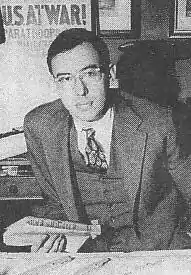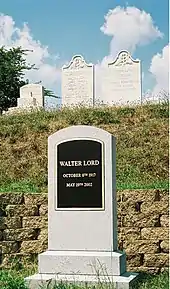Walter Lord
John Walter Lord Jr. (October 8, 1917 – May 19, 2002) was an American lawyer, ad man, author and popular historian, best known for his 1955 account of the sinking of the RMS Titanic, A Night to Remember.
Walter Lord | |
|---|---|
 Walter Lord, 1958 | |
| Born | John Walter Lord Jr. October 8, 1917 Baltimore, Maryland, U.S. |
| Died | May 19, 2002 (aged 84) Manhattan, New York, U.S. |
| Resting place | Green Mount Cemetery, Baltimore, Maryland |
| Occupation | Historian, Author |
| Nationality | American |
| Alma mater | Princeton University; Yale Law School |
| Period | 1952–1986 |
| Genre | Narrative history |
| Notable awards | Francis Parkman Prize for Special Achievement (1994)[1] |
Biography
Early life
Lord was born in Baltimore, Maryland to John Walter Lord Sr. and Henrietta MacTier (Hoffman) Lord on October 8, 1917. His father, who was a lawyer, died when Lord was just three years old. Lord's grandfather, Richard Curzon Hoffman, was president of the Baltimore Steam Packet Company ("Old Bay Line") steamship firm in the 1890s.[2]
In July 1925, at the age of 7, Lord traveled across the Atlantic Ocean with his mother and sister, from New York to Cherbourg and Southampton, on the RMS Olympic,[3] the Titanic's sister ship.[4] Like many other boys who attended high school at Baltimore's Gilman School, he spent his summers at Hyde Bay Camp for Boys in Cooperstown, NY,[5] where he was awarded the honorary title of "The Commodore" and later returned to reign over many annual camp events, like the eight inch regatta and closing barbecue and bonfire. He then studied history at Princeton University and graduated in 1939.[6] Lord then enrolled at Yale Law School, interrupting his studies to join the United States Army after the attack on Pearl Harbor. During World War II, he was assigned to the Office of Strategic Services as a code clerk in London, in 1942. He was the agency's secretariat when the war ended in 1945. Afterwards, Lord returned to Yale, where he earned a degree in law.[6]
Career
Lord wrote, or edited and annotated 11 bestselling books[7] on such diverse subjects as the Attack on Pearl Harbor (Day of Infamy, 1957), the Battle of Midway (Incredible Victory, 1967), the Battle of the Alamo (A Time to Stand, 1961), the Battle of Baltimore (The Dawn's Early Light, 1972), Arctic exploration (Peary to the Pole, 1963), pre-World War I America (The Good Years: From 1900 to the First World War, 1960), Coastwatchers (Lonely Vigil, 1977), the Dunkirk evacuation (The Miracle of Dunkirk, 1982), and the civil rights struggle (The Past That Would Not Die, 1965[8]).

Shortly after going to work as a copywriter for the J. Walter Thompson advertising agency in New York City, Lord published The Fremantle Diary, edited and annotated from the journals of the British officer and Confederate sympathizer, Arthur Fremantle, who toured the South for three months in 1863. It became a mild, but surprising, success in 1954, as Lord was well into completing A Night to Remember, which would win him much popular acclaim.
A Night to Remember, about the sinking of the RMS Titanic, became a bestseller in 1955 and was made into a popular 1958 British movie of the same name. The historian tracked down 63 Titanic survivors and wrote a dramatic, minute-by-minute account of the ocean liner's sinking during her maiden voyage.[6] Lord's knowledge of the Titanic catastrophe achieved considerable renown, and he frequently lectured at meetings of the Titanic Historical Society. In his final years, Lord wrote another book about the Titanic titled The Night Lives On: Thoughts, Theories and Revelations about the Titanic,[9] published in 1986, a year after the wreck of the Titanic was discovered and interest in the Titanic renewed again. In the next decade, Lord served as a consultant to director James Cameron during the filming of Titanic (1997). The sequel documentary to Cameron's film Titanic, Ghosts of the Abyss (2003), was dedicated to Lord's memory.
In 2009, Jenny Lawrence edited and published a biography of Lord — The Way It Was: Walter Lord on His Life and Books. In the late 1980s, Lawrence had recorded hours of interviews she had with Lord, in which he discussed his writing and life. After chapters on his early life in Baltimore and up to his time with the OSS in London and Paris, chapters are devoted to his research and writing of each of his books.[10]
Death

Lord, a lifelong bachelor, died at age 84 on May 19, 2002, after a long struggle with Parkinson's disease, at his Manhattan home.[6] Noted historian David McCullough said of Lord at his death, "He was one of the most generous and kind-hearted men I've ever known, and when I had stars in my eyes and wanted to become a writer, he was a great help. I'll always be indebted to him."[6]
Lord is buried in his maternal family's plot at historic Green Mount Cemetery in Baltimore. His grave is marked by a marble bench listing the books he authored.
Publications
Lord published 12 historical works:[11][12]
- The Fremantle Diary (1954) (ed.)
- A Night to Remember (1955)
- Day of Infamy (1957)
- The Good Years (1960)
- A Time to Stand (1961)
- Peary to the Pole (1963)
- The Past That Would Not Die (1965)
- Incredible Victory (1967)
- The Dawn's Early Light (1972)
- Lonely Vigil (1977)
- The Miracle of Dunkirk (1982)
- The Night Lives On: Thoughts, Theories and Revelations about the Titanic (1986)[13]
References
- "Francis Parkman Prize for Special Achievement – The Society of American Historians". sah.columbia.edu. Archived from the original on August 23, 2010. Retrieved August 31, 2010.
- Alexander Crosby Brown (1961). Steam Packets on the Chesapeake. Cambridge, Maryland: Cornell Maritime Press. LCCN 61012580.
- UK Southampton Incoming Passenger List dated July 16, 1925
- "Titanic Historical Society, Inc. : Walter Lord Memories of the Olympic". titanic1.org. Retrieved April 9, 2012.
- "Hyde Bay Camp For Boys, Walter Lord At Hyde Bay Camp".
- Frederick N. Rasmussen (May 21, 2002). "Baltimore-born author dies, wrote classic Titanic book". The Baltimore Sun.
- Lord edited and annotated but did not write The Fremantle Diary (1954).
- Lord, Walter (June 1965). The Past That Would Not Die. The Past That Would Not Die. Harpercollins. ISBN 978-0-06-012700-8.
- Lord, Walter (1986). The Night Lives On: Thoughts, Theories and Revelations about the Titanic. London: Penguin. ISBN 0-14-027900-8.
- Lawrence, Jenny, ed. (July 2009). The Way It Was: Walter Lord on His Life and Books The Titanic Historical Society, Inc.>. Ubuildabook. ISBN 978-0-615-25973-4.
- "Titanic Historical Society, Inc. : Walter Lord". titanic1.org. Archived from the original on July 15, 2002. Retrieved August 31, 2010.
- "Mathey College – Walter Lord Society". princeton.edu. Retrieved August 31, 2010.
- Lord, Walter (1986). The Night Lives On (1st ed.). New York: Morrow. ISBN 9780688049393.
Full title of some later editions: The Night Lives On: Thoughts, Theories and Revelations about the Titanic.
Further reading
- Krebs, Albin & Pyle, Richard (2002). "A Tribute to Walter Lord". The Titanic Historical Society. Archived from the original on July 15, 2002.CS1 maint: uses authors parameter (link)
